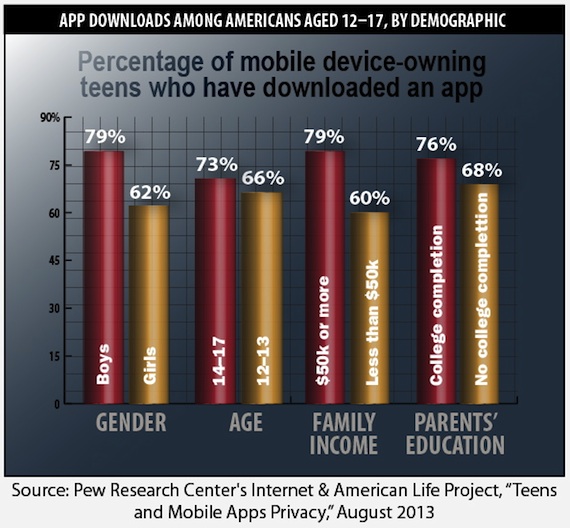Privacy Concerns Drive Teens' App Downloads and Usage
American teens are concerned enough about their privacy to let their concerns drive app download choices. According to a new survey conducted by the Pew Research Center's Internet & American Life Project, more than half of teens (51 percent) who have downloaded apps to their mobile phones and tablets have avoided certain apps over worries about privacy.
Do Not Track
The survey, conducted by Pew and the Berkman Center for Internet & Society at Harvard University, also found that among those who had downloaded apps (58 percent of teens who participated in the survey), more than a quarter (26 percent) have intentionally uninstalled an app after discovering the software collected personal information about them.
Among teen app users, 48 percent have turned off location tracking features either on their phones or within specific apps. A higher percentage of girls (57 percent versus 37 percent) have disabled location tracking, according to the report.
"Teens are on the front lines of figuring out the complex world of privacy management of on their mobile devices," said Mary Madden, lead author and senior researcher for the Pew Internet Project, in a statement released to coincide with the report. "They realize that cell phones can be used to monitor their whereabouts, and they will avoid apps if they feel like the data requests are unnecessary or excessive."
The survey and follow-up interviews were conducted among a representative sample of kids aged 12–17 and their parents in the United States. The survey portion actually took place last year, well before the revelations about the NSA's surveillance of American citizens via PRISM, XKeyscore, and other covert data collection programs. A Pew spokeswoman told us the organization plans a follow-up survey this year, "and we'll be eager to see if teens are aware of the NSA story and whether it has had any impact on their attitudes and behavior." Focus group interviews took place in February, March, and April of this year.
Stats: Teen Mobile Device and App Ownership
The report, "Teens and Mobile Apps Privacy," indicated that 82 percent of teens owned at least one mobile device at the time of the survey (last summer). Seventy-eight percent owned cell phones, and 23 percent owned a tablet. Seventy-one percent of mobile device owners have downloaded an app (representing about 58 percent of the overall teen population).
Among focus group participants, the type of app downloaded tended to be social media apps games but also included news, music, and weather apps. Teens indicated they often download apps simply because they're free but also look at pictures, ratings, and the number of downloads "to determine the quality of the app." One of the side benefits of free apps cited by the kids who participated in the survey was the fact that they don't need their parents' permission to download the software.

The App Divide
Family income, parents' education level, and gender played a role in determining whether teens downloaded apps or not.
- 79 percent of teens from wealthier families ($50,000 or higher household income) have downloaded apps versus 60 percent for those in lower-income families.
- 76 percent of teens whose parents have completed college have downloaded an app versus 68 percent of those whose parents have not had only some college or have completed high school.
- 79 percent of boys versus 62 percent of girls have downloaded apps.
- There was not a statistically significant difference in downloads between white and non-white teens.
The complete report, "Teens and Mobile Apps Privacy," is available at pewinternet.org.